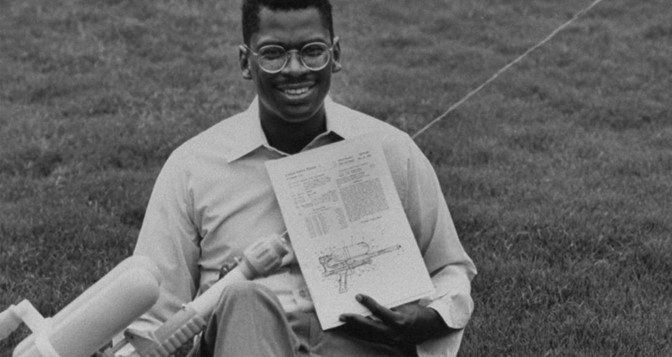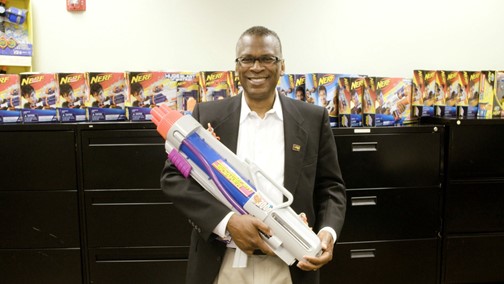Synopsis
Lonnie G. Johnson, born in October 6, 1949 in Mobile, Alabama, is a prominent American inventor and aerospace engineer renowned for creating the Super Soaker water gun in 1989. His career spans groundbreaking contributions to NASA and the U.S. Air Force, alongside pioneering work in renewable energy technologies like the Johnson Thermoelectric Energy Converter (JTEC).
Introduction
Lonnie G. Johnson, a visionary inventor and engineer, emerges as a beacon of innovation from the heart of Mobile, Alabama. His journey parallels a narrative of determination and brilliance, starting with his humble beginnings tinkering with toys crafted alongside his father.
From the iconic Super Soaker water gun to pioneering advancements in renewable energy through the Johnson Thermoelectric Energy Converter, Johnson’s career exemplifies a relentless pursuit of technological advancement and sustainable solutions. His impact extends far beyond mere inventions, shaping industries and inspiring generations with his transformative ideas and entrepreneurial spirit.
1. Who Is Lonnie G. Johnson?

Lonnie G. Johnson, born on October 6, 1949, in Mobile, Alabama, emerges as a pioneer whose inventive spirit transcends conventional boundaries. From early childhood, Johnson displayed a natural curiosity and aptitude for engineering, nurtured by his father’s guidance in constructing toys and gadgets.
His journey through Tuskegee University, where he earned degrees in mechanical and nuclear engineering, laid the foundation for a remarkable career marked by innovation and achievement. Best known for inventing the iconic Super Soaker water gun in 1989, Johnson’s impact extends beyond toys, encompassing advancements in energy technologies like the Johnson Thermoelectric Energy Converter (JTEC), aimed at revolutionizing renewable energy solutions. His story embodies resilience, creativity, and a relentless pursuit of scientific excellence, inspiring future generations to explore the frontiers of possibility.
2. What Makes Lonnie G. Johnson So Special?
Lonnie G. Johnson embodies the essence of innovation and perseverance, distinguishing himself through a remarkable blend of engineering brilliance and entrepreneurial acumen. His invention of the Super Soaker in 1989 revolutionized the toy industry, becoming a cultural icon and generating over $1 billion in sales to date. Beyond this groundbreaking achievement, Johnson’s career spans pivotal roles at NASA and the U.S. Air Force, where he contributed to missions like Galileo and Cassini, showcasing his expertise in aerospace engineering and space exploration.
His ongoing work in advanced energy technologies, particularly with the Johnson Thermoelectric Energy Converter, underscores his commitment to sustainable energy solutions that could reshape global energy markets. Johnson’s journey from a childhood marked by curiosity and tinkering to a prolific inventor with over 250 patents exemplifies his unwavering dedication to pushing the boundaries of science and technology, while his advocacy for education and mentorship cements his legacy as a visionary and a role model for future innovators.
3. What Does Lonnie G. Johnson Care About?

Lonnie G. Johnson is a visionary inventor and engineer whose passions and pursuits extend across multiple domains, reflecting his deep commitment to innovation, education, and community service. Born in Mobile, Alabama in 1949, Johnson’s early experiences crafting toys with his father ignited his lifelong fascination with invention. Inspired by fellow Black inventor George Washington Carver, Johnson embarked on a journey marked by relentless curiosity and ingenuity.
His crowning achievement, the invention of the Super Soaker in 1989, revolutionized outdoor water play and became a cultural icon, showcasing Johnson’s ability to blend creativity with engineering excellence. Beyond toy innovation, Johnson’s focus on sustainable technology led him to develop the Johnson Thermoelectric Energy Converter (JTEC), a groundbreaking device aimed at enhancing solar energy efficiency.
Johnson’s commitment to education and mentorship is evident through his involvement with organizations like the 100 Black Men of Atlanta and the Georgia Alliance for Children, where he serves as a board chairman. Recognized for his contributions, Johnson was inducted into the National Inventors Hall of Fame in 2022, underscoring his enduring impact on science, technology, and community empowerment.
4. What Are Lonnie G. Johnson's Greatest Deeds?
The greatest deed of Lonnie G. Johnson lies not just in his inventions, but in his unwavering commitment to innovation that benefits humanity and the environment. Born in Mobile, Alabama in 1949, Johnson’s journey from a childhood spent building toys with his father to becoming a pioneering inventor is marked by transformative achievements.
His crowning invention, the Super Soaker, introduced in 1989, revolutionized outdoor water play and became a cultural phenomenon, illustrating Johnson’s knack for blending creativity with engineering prowess. Beyond entertainment, the Super Soaker generated substantial revenue and paved the way for Johnson to pursue more ambitious projects in sustainable energy.
Johnson’s dedication to environmentally friendly technology led him to develop the Johnson Thermoelectric Energy Converter (JTEC), aimed at significantly boosting the efficiency of solar energy conversion. This innovation holds the promise of making solar power competitive with traditional energy sources, potentially reshaping global energy dynamics towards sustainability.
Beyond his technical achievements, Johnson’s contributions extend into education and community service. He actively mentors youth through organizations like the 100 Black Men of Atlanta and champions children’s causes as board chairman of the Georgia Alliance for Children. His induction into the National Inventors Hall of Fame in 2022 underscores his lasting impact on science, technology, and society.
5. What Has Lonnie G. Johnson Faced as Challenges?
Lonnie G. Johnson has faced numerous challenges throughout his remarkable career, overcoming obstacles both personal and professional:
Racial Discrimination and Segregation: Growing up in Mobile, Alabama, during the era of legal segregation, Johnson attended segregated schools where opportunities for Black students were limited. Despite being exceptionally talented and curious, he was often advised to pursue careers as a technician rather than aspire to be an inventor.
Technical and Entrepreneurial Challenges: While working as a scientist and engineer for institutions like NASA and the U.S. Air Force, Johnson pursued his inventions in his spare time. Bringing the Super Soaker to market involved years of tinkering, pitching, and overcoming initial commercial failures before achieving massive success.
Innovation and Funding Hurdles: Developing the Johnson Thermoelectric Energy Converter (JTEC), a groundbreaking technology aimed at revolutionizing solar energy conversion, presented significant technical and financial challenges. Securing funding and overcoming technical hurdles in developing advanced energy technologies required persistence and vision.
Legal Battles and Business Struggles: Despite the success of the Super Soaker, Johnson faced legal battles over royalties, highlighting challenges in navigating corporate partnerships and protecting intellectual property rights.
Financial Struggles and Economic Pressures: Johnson’s family faced economic challenges, with his parents working multiple jobs to support their six children. His father, a skilled handyman, taught him to build toys from a young age, instilling in him a love for invention despite financial constraints.
Educational Barriers: Even after displaying his innovative talents at a young age and winning accolades at science fairs, Johnson faced educational barriers due to racial segregation. He attended Tuskegee Institute on a scholarship, navigating a system where opportunities for Black students were still limited.
6. What Keeps Lonnie G. Johnson Motivated?

Lonnie G. Johnson draws motivation from several sources that fuel his relentless pursuit of innovation and impact. Firstly, his childhood experiences with his father, who encouraged his creativity and taught him the value of hands-on learning, instilled a deep passion for invention and problem-solving. Johnson’s admiration for George Washington Carver, another pioneering Black inventor, serves as a continuous inspiration to push boundaries and achieve breakthroughs in technology.
The success of the Super Soaker, from its initial creation to its global impact and recognition in the National Toy Hall of Fame, underscores Johnson’s drive to create products that bring joy and utility to millions worldwide. His ongoing work on the Johnson Thermoelectric Energy Converter (JTEC), aimed at revolutionizing renewable energy, reflects his commitment to sustainable solutions and tackling global challenges like climate change.
Recognition, such as his induction into the National Inventors Hall of Fame and various awards, reaffirms Johnson’s impact and encourages him to explore new frontiers in science and technology. Additionally, his involvement in mentoring and community initiatives, such as the 100 Black Men of Atlanta and the Boys & Girls Club, reflects his dedication to empowering future generations and leaving a lasting legacy of innovation and service.
7. Why Is Lonnie G. Johnson Such a Role Model?
Lonnie G. Johnson stands as a role model due to his remarkable journey from a childhood of modest means and racial segregation to becoming a pioneering inventor and entrepreneur. Against the odds, he pursued his passion for engineering, leveraging his ingenuity to create transformative technologies like the Super Soaker and the Johnson Thermoelectric Energy Converter (JTEC).
His dedication to sustainability through innovations in solar energy and battery technology underscores his commitment to global environmental challenges. Beyond his technical achievements, Johnson actively mentors youth through organizations like the 100 Black Men of Atlanta and champions educational initiatives. His induction into the National Inventors Hall of Fame and numerous accolades highlight his profound impact and inspire future generations in science and engineering.
8. What Is Lonnie G. Johnson Currently Working On?
Currently, Lonnie G. Johnson is actively involved in several innovative projects. He continues to lead Johnson Research & Development and Johnson Battery Technologies Inc., focusing on advancements in battery technology. Particularly notable is his ongoing work with the Johnson Thermoelectric Energy Converter (JTEC), aimed at revolutionizing solar energy conversion by improving efficiency. Recently, JTEC Energy Inc., under his guidance, achieved significant milestones in developing models of the converter capable of harnessing waste heat effectively. Johnson remains dedicated to green technology and sustainable energy solutions, positioning himself as a key figure in shaping the future of renewable energy technologies. His commitment to innovation and environmental stewardship underscores his enduring influence in the fields of engineering and sustainable development.
9. What Could Slow Lonnie G. Johnson Down?
Several factors could potentially slow down Lonnie G. Johnson’s progress despite his notable achievements and ongoing projects. Firstly, the complex and lengthy process of developing innovative technologies like the Johnson Thermoelectric Energy Converter (JTEC) requires substantial financial and institutional support, which can be challenging to secure consistently. Additionally, navigating intellectual property rights and legal disputes, as seen with his battles over royalties from the Super Soaker, could divert time and resources from his primary research and development efforts.
The competitive nature of the renewable energy sector also poses challenges, requiring continuous innovation and adaptation to stay ahead. Furthermore, societal and systemic barriers, including historical inequalities and limited access to resources for underrepresented groups in STEM fields, could impact Johnson’s ability to scale his inventions globally. Lastly, while Johnson’s entrepreneurial spirit drives him, managing multiple ventures simultaneously, such as Johnson Battery Technologies Inc., could spread resources thin and require careful prioritization to maintain momentum in each area of innovation.
10.What Can You Learn From Lonnie G. Johnson?

Lonnie G. Johnson’s remarkable journey offers several valuable lessons:
Persistence and Perseverance: Continuing to refine his inventions despite challenges, ultimately achieving success with the Super Soaker and pioneering energy technologies.
Innovation and Creativity: Demonstrating the power of creativity in problem-solving and developing transformative technologies.
Community and Mentorship: Commitment to mentoring and supporting future generations, highlighting the importance of giving back.
Adaptability and Diversification: Transitioning from engineering roles to founding his own company and venturing into sustainable energy solutions.
Environmental and Social Impact: Focusing on developing environmentally friendly technologies to address global challenges.
Recognition and Legacy: Receiving prestigious accolades that acknowledge his significant contributions to science, technology, and society.
Pro Tips
- Follow your passion: Pursue what you love, as Johnson’s story exemplifies the power of passion in driving groundbreaking inventions.
- Persist through challenges: Emulate Johnson’s perseverance in refining his ideas, even when faced with setbacks, to achieve success.
- Think beyond boundaries: Johnson’s diverse career highlights the value of combining expertise and exploring unconventional solutions.
- Embrace curiosity and experimentation: Cultivate a mindset of continuous learning and willingness to explore new possibilities.
- Seek opportunities for impact: Leverage your skills and innovations to make a positive difference in society, as Johnson did.
- Believe in the transformative power of education: Invest in lifelong learning to develop the expertise needed for innovation.
- Adapt and innovate: Demonstrate the agility to apply your skills in diverse contexts, as Johnson did throughout his career.
Summary
Lonnie G. Johnson, born on October 6, 1949, in Mobile, Alabama, is renowned for inventing the Super Soaker in 1989, which became one of the best-selling toys globally and was inducted into the National Toy Hall of Fame in 2015. Beyond toys, Johnson’s career spans developing more efficient rechargeable batteries and pioneering the Johnson Thermoelectric Energy Converter (JTEC), aimed at revolutionizing solar energy conversion.
He holds degrees in mechanical and nuclear engineering, served in the U.S. Air Force and NASA, and continues to innovate through his company, Johnson Research & Development. Johnson’s achievements also include induction into the National Inventors Hall of Fame in 2022.


















